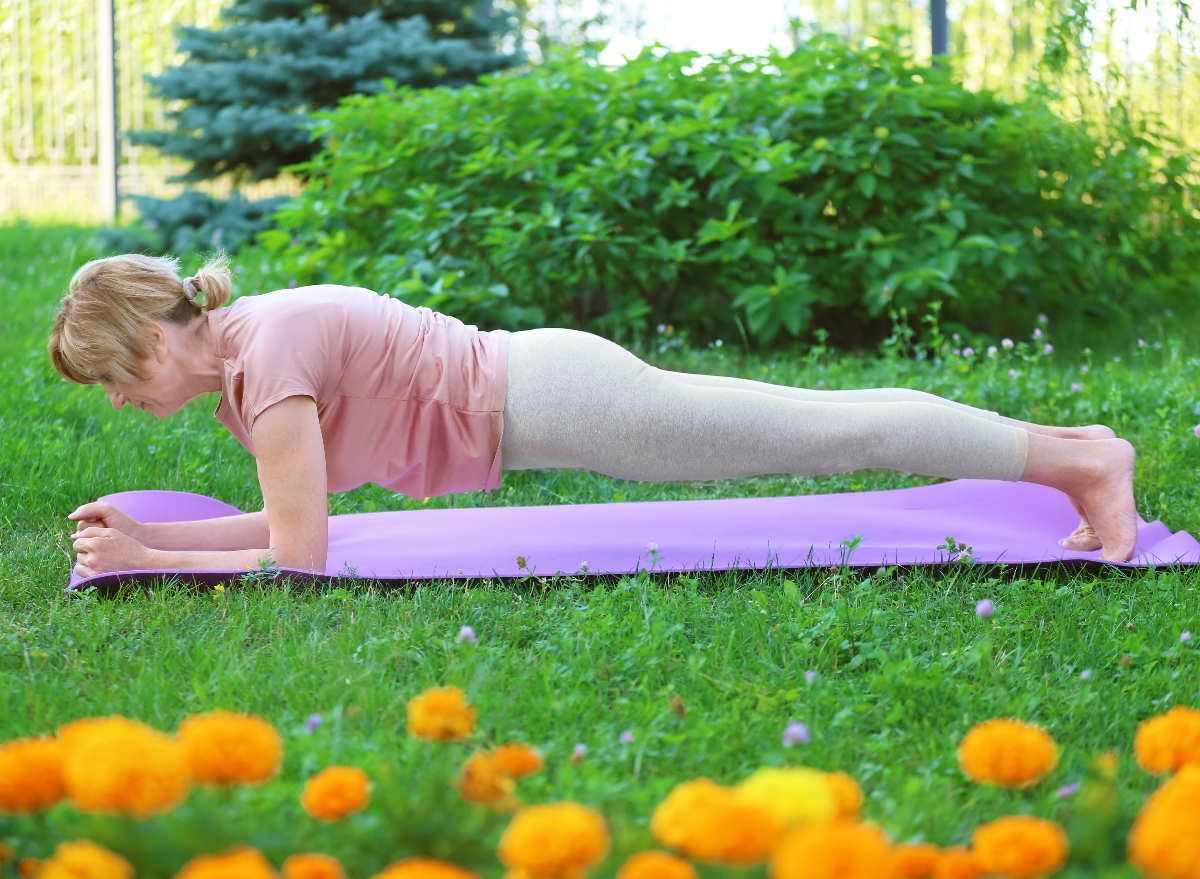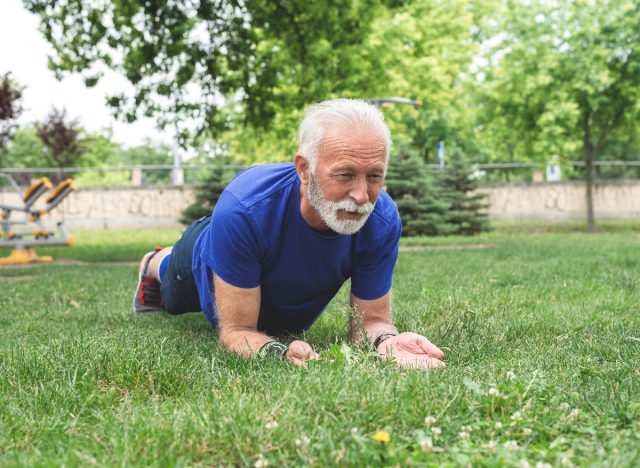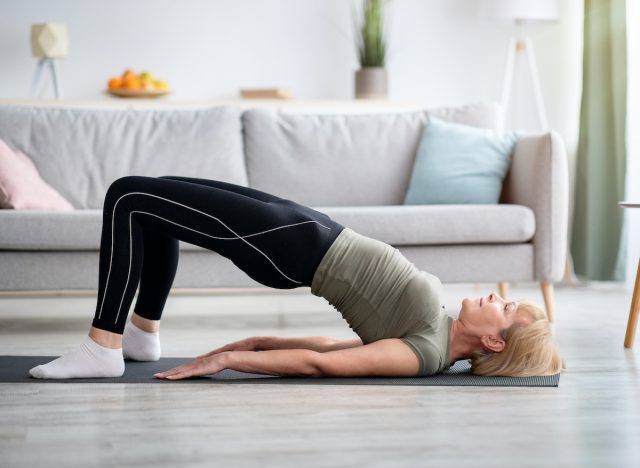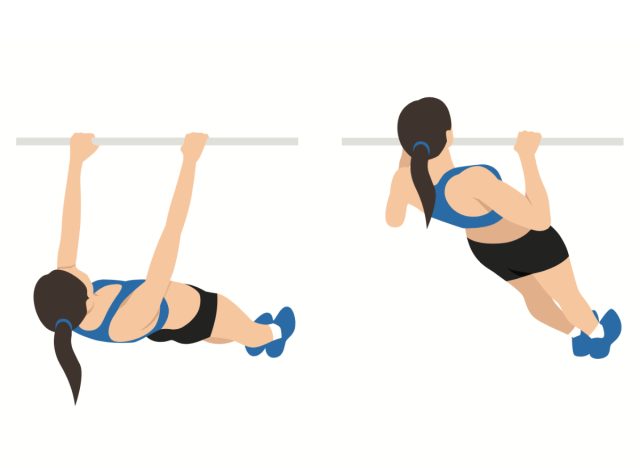The 7 Best Back-Strengthening Exercises for Seniors

Here's the painful truth: As many as 75% of all seniors suffer from back pain, research reveals. (No pun intended.) While the aches are bad enough, to make matters worse, they can tremendously limit activity levels, which leads to even more health problems. Thankfully, there are many great solutions, no matter your situation. One of those solutions is through exercise. We're here with the seven best back-strengthening exercises for seniors, so listen up.
The best way to avoid lower back pain is to strengthen the correct muscles that support and stabilize your spine and torso to keep everything protected and in healthy alignment. We'll break down the best exercises that take the stress off your lower back and can make a tremendous difference over time.
Keep reading to learn all about back-strengthening exercises for seniors, and next, don't miss The Best Leg-Strengthening Exercises for Seniors.
Plank

If you want a healthier lower back, start here. The plank is one of the easiest and most effective exercises to strengthen your entire midsection so you can stabilize your lower back. That way, as you move throughout your day, you can keep your spine safe and protected.
Here's how to do it: Get into a plank position, resting on your forearms and keeping your body straight. Push your forearms into the ground to round your upper back, and curl your hips in to keep your lower back flat. To make it easier, start with your forearms on a higher surface; then, shift to lower surfaces until you're on the ground.
Hip Bridge

Often, lower-back issues are a symptom of weak glutes and hamstrings. When those muscles lack strength, your lower back compensates, which creates unnecessary stress and tension and puts your back in unsafe positions.
Here's how to do it: Lie on the ground with your knees bent and your feet flat on the floor. Drive through your heels and squeeze your glutes to push your hips up. Repeat. Do not use your lower back you pull yourself up.
Half-Kneeling Single-Arm Cable Row
By doing exercises on one knee with your feet in line—called "half-kneeling"—you boost the stability in your core and hips, improve your balance, and avoid overcompensating with your lower body (or leaning too far back or forward), all of which keep your lower back very happy.
Here's how to do it: In the half-kneeling position, aim your body toward the cable machine, and keep your feet in line. For your back leg, rest your laces on the ground. Squeeze the glute on your rear leg, and keep your pelvis underneath you. With a cable set to chest height, grab the handle, and start by pulling your shoulder blade toward your midline, and row without twisting your torso. Once you finish all your reps, switch sides.
Inverted Row

Rows are a great exercise to strengthen your entire back and improve your overall posture. Even better, by doing this bodyweight version, you also strengthen your core for extra lower-back benefits.
Here's how to do it: Set a barbell on a power rack or Smith Machine and, from underneath, pull yourself up and touch your chest to the bar. Pin your shoulder blades together, and keep your body straight like a plank.
Bench Pushups
Everyone should do pushups: They strengthen so many muscles in your upper body, blast your core, and—for your lower back health—teach you how to tense your entire body and maintain good posture in your lower back and pelvis.
Here's how to do it: Get in a pushup position with your hands about shoulder-width apart and your hands on a sturdy bench or box. Keep your lower back flat, and don't let your hips sag. Lower yourself, and keep your elbows close to your body as you descend. Touch your chest to the bench and push.
Kneeling Pallof Press
The Pallof press is undoubtedly one of the best exercises for lower-back issues. You tremendously strengthen your abs, obliques, and lower back and train them to resist rotation so you keep your spine in a healthy position.
Here's how to do it: Get on both knees, and set a cable handle to chest height. While facing perpendicular to the cable, bring the handle to your chest. Brace your core, squeeze your glutes, and keep your shoulders and hips directly over your knees. Push the handle straight forward, and hold for three seconds. Bring it back to your chest, and repeat. Then, switch sides, and repeat.
Side Planks

The side plank targets your core from a completely different angle and targets the deeper core muscles such as the transversus abdominis. And trust me, you can never have "too much" core strength—especially if you have a cranky lower back.
Here's how to do it: Lie on your side, and place your forearm on an elevated surface—like a table, bench, or box—perpendicular to your body, as demonstrated in the photo above. Keep your body straight, your glutes squeezed, and your shoulders pulled back. Don't let your hips sag. To make it easier, start with your forearms on a higher surface; then, shift to lower surfaces until you're on the ground.








